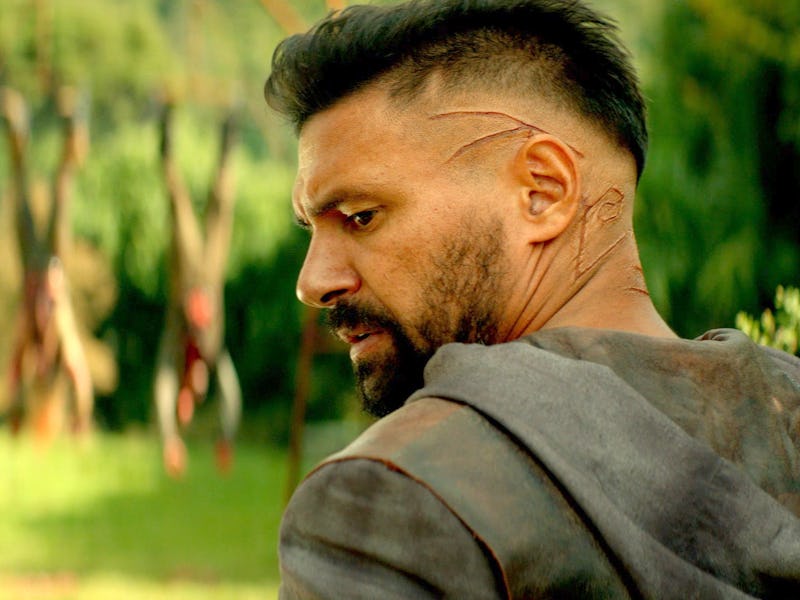MTV's 'Shannara Chronicles' Rides Non-Existent 'Game of Thrones' Backlash
Six years after HBO's hit deconstructed the heroic fantasy genre, MTV is asking elves to rebuild.

The Shannara Chronicles is the sort of fantasy show that’s almost never seen on American TV, which is the convoluted way of saying that it’s totally conventional fantasy. It swims in the runoff from Game of Thrones, which is ironic, because it’s exactly the sort of story that Thrones was rebelling against when it came out in the mid-1990s. It’s Princess Bride without the joy; Robin Hood without the economics.
Shannara is a story of magic rocks, runaway princesses, demon wizards, and chosen heroes. It’s not shy about this, opening in a lush Elven forest full of teens with pointy ears and little to no acne competing for the right to be chosen by a beautiful, magical tree. This is followed by shirtless druids, magic swords, and an endless supply of capitalized imaginary words like “Dagda Mor” (the villain) or Ellcrys (the plant). One grand declaration leading into a commercial break after another, each character endeavors to make the same point: Shannara is a magical place devoid of irony.
“Heroic fantasy” (or high fantasy, or epic fantasy, depending) is the combination of grand Lord of the Rings-style adventure with an Arthurian “chosen one” narrative. A rural boy — very occasionally a girl — discovers that he’s the long-lost something with the opportunity to defeat a rising, probably-ancient evil something. He gathers up a diverse squad, with appropriate numbers of elves, dwarves, and wizards, and rolls the twenty-sided dice of fate.
Throughout the 1980s and 1990s, this was the dominant mode of fantasy novels, thanks largely to two main influences: Terry Brooks’ The Sword of Shannara (the prequel to the novel the Shannara show is based on) and Star Wars. Despite its science fiction facade, Star Wars, made by George Lucas with his nose buried in Joseph Campbell’s Hero With a Thousand Faces, was about as pure a heroic fantasy story as could be — and it was obviously influential over almost all pop culture.
The Sword of Shannara was published in 1977, the same year as Star Wars. It was largely a Lord of the Rings knockoff, right down to its Gandalf figure saving the party by grabbing a Balrog/Nazgul-like “Skull Bearer” and falling into a pit with it halfway through (and then coming back). The most important difference: Sword’s protagonist, Shea Ohmsford, isn’t just a strong, decent person like Frodo Baggins, but, a la The Sword in the Stone, he’s the only surviving heir to the royal Shannara bloodline, and hence he is the only one whose magic can save the world.
It’s this sort of narrative that Game of Thrones seems to work against from its start. Its two most shocking events — the Steps of Baelor and the Red Wedding — were about killing off the supposed heroes. Sansa’s story is almost entirely about how there isn’t good versus evil and courtly love, and knights more likely to be nasty, not less. But one of the secrets to Thrones’ success is that it tries to have its cake and eat it too, with Jon and Dany’s stories both being very traditional high fantasy in text, if not in tone.
Poppy Drayton as the Elven Princess Amberle in 'The Shannara Chronicles'
GOT is a self-aware heroic fantasy written, and put on-screen, as something darker and dirtier. Similarly, the other great visual fantasy of the last few decades, Lord of the Rings, told a simpler heroic story, but its world appeared tragic and dirty. The key difference between LOTR and its followers, then: Lord of the Rings says “Elves are sad and rare” while stories like Shannara say “Elves are fucking awesome!”
The very conventionality of Shannara may make it conceptually appealing, but it doesn’t necessary make it good. The era of fantasy The Sword of Shannara helped institute led to decades of “chosen one” narratives checking off genre conventions. (I remember one SF author referring to this genre as “elf crap.”) And if Shannara were based on the original novel in the series, it would be in more trouble.
The cover of Terry Brooks' 'The Elfstones of Shannara'
Happily, Shannara is based on the second and far superior novel, The Elfstones of Shannara. Blending a typical hero’s journey with military fantasy and a horrific, implacable demon villain, Elfstones was both more exciting and far darker than its predecessor. It’s also more interesting in terms of gender, with the nearly all-male cast of the earlier LOTR wannabe replaced by relative gender parity, with two ass-kicking young ladies at the heart of its action. (In this, Shannara once again parallels Star Wars, nearly four decades later.)
It’s a strange world where a heroic fantasy series can appear on TV — on MTV, at that! — and only after the genre has been deconstructed by Game of Thrones. It’s even stranger that Shannara is a slick, competent retelling of its source material. Whether the source material is worth the retelling … that remains to be seen.